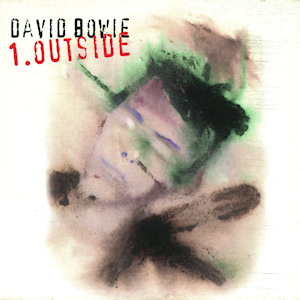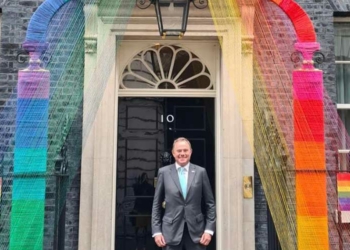It’s the beginning of the twenty-first century. A girl in her young teens is being prepared for mutilation or worse, a ritual ‘art crime’, egged on by preening psychopathic narcissists on the internet.
Except this is actually 1995, and these things are taking place only in the imagination of David Bowie on his new concept album ‘Outside’. (Technically it’s called ‘1.Outside’ for arcane reasons, but let that not detain us.)
At the time – the height of prosaic, up-the-apples-and-pears, very-big-house-in-the-country Britpop – Outside seemed dated and naff, a dilettantish grab at relevance from a middle-aged stadium rocker trying to detoxify his brand and restore his long-lost credibility. Its futuristic scenario, spiky sound (it’s not an easy listen), sprawling length and plethora of silly, electronically-treated voices just seemed irretrievably daft.
It now appears that Bowie, in this tale of the ‘editing’ of bodies to match online avatars and modish internet cults, was on to something, ahead of everybody else.
Bowie was always an alarmist. His very first album in 1967 contains a song about overpopulation, with civilisation descending to mass cannibalism. By 1970 he was envisaging a computer taking the decision to cleanse the planet of humanity. At the height of his first wave of mega-success in 1973, ‘Aladdin Sane’ is about fashionable decadence on the brink of an unspecified global disaster. Even his biggest mainstream global hit, 1983’s ‘Let’s Dance’ has a shade of the apocalypse in it.
It now appears that Bowie, in this tale of the ‘editing’ of bodies to match online avatars and modish internet cults, was on to something, ahead of everybody else.
Pop music – like the early adolescence it is entwined with – lends itself to dark moods and doomy predictions. From Barry McGuire’s ‘Eve Of Destruction’ in 1965 to Janelle Monáe’s stunning ‘Dirty Computer’ in 2018, doom sells to teenagers leaving childhood and coming to grips with adult struggles and concerns, testing the allure of the dark, just as younger children love scary fairytales.
The thing with such pop predictions is that something *is* bound to go wrong, so like a celebrity psychic, if you scatter enough guesses about you’ll get hailed as a prophet for your one good one.
And I think Outside is Bowie’s most accurate stab.

‘Outside’ album cover: The cover art copyright is believed to belong to the label Arista/BMG, or the graphic artist(s); source Wikipedia.
In 1995, there were only about ten thousand websites in the world. (There are now 45 billion.) Going online involved expensive contracts, maddeningly slow and unsteady modem connections that made weird 50s sci-fi sounds, and being charged by the minute on your landline bill. Mobile phones were rare, and people still had cameras.
So Bowie’s tech fear seemed very funny, like a Victorian lady terrified of the telephone. And his depiction of a coterie of post-religious dyed-haired narcissists chopping at children’s bodies just sounded freakishly mad. He was inspired by then-current conceptual artists like Damien Hirst, but that seemed a very big leap from pickling a dissected shark.
It doesn’t seem so daft now, and listening to Outside in the 2020s is a sobering experience.
This is the hard stuff, when the harmless play-acting and dress-up turn sour, when exhibitionism and narcissism tip over into toxicity. It’s the world of Michael Alig, Desmond Is Amazing, the shrieking, paranoid personality disorders of the anime-avatared, and whatever ‘queer’ is supposed to mean now.
Crucially, unlike Bowie’s earlier excursions into decadence, it isn’t *fun*. The nihilism of, for example, 1974’s ‘Diamond Dogs’ is backed by upbeat rock and soul tunes, and even its slower, darker moments have an attractive sheen, a sense of playing with paranoia and decay in a framework of catnip melodies.
But Outside is raw, aggressive and uncomfortable. (Its most famous song, Hello Spaceboy, became a more anodyne hit single with help from the Pet Shop Boys; the album version is unrelentlessly thumping industrial rock.) This is the hard stuff, when the harmless play-acting and dress-up turn sour, when exhibitionism and narcissism tip over into toxicity. It’s the world of Michael Alig, Desmond Is Amazing, the shrieking, paranoid personality disorders of the anime-avatared, and whatever ‘queer’ is supposed to mean now.
It’s our world.
Bowie was often criticised for what we would now call ‘cultural appropriation’ – a pretender who dabbled, stealing vampirically from the more sordid, disturbing end of gay experience for the prurient titillation of teenagers.
But I think his special gift in this regard was seeing the darker aspects of our world and extrapolating from them. A view from outside can take in the wood and the trees. And nowhere is this more apparent than in ‘Outside’ – he saw what was coming, and back then his prediction seemed ridiculous.
Gareth Roberts is a screenwriter, novelist and journalist.
























How I despise the "cultural appropriation" police! Borrowing from other cultures is how fashion happens, how music happens, how art happens. How progress happens, really. Without it we'd have no Rock 'n' Roll, no Jazz, no Disco, no Klezmer, no Afro-Celtic music. Yes, there's been taking from others without giving proper credit, and disrespectful appropriation, but the solution to all that is not forcing everyone to stay in their zone. Those who consider themselves true artists, like the late David Bowie, are all but mandated to borrow, blend and re-invent. Segregation of any kind is anathema to them, and rightly so.